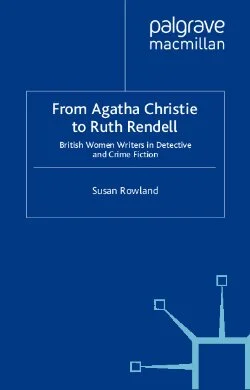From Agatha Christie to Ruth Rendell: British Women Writers in Detective and Crime Fiction
By Susan Rowland
From Agatha Christie to Ruth Rendell is the first book to consider seriously the hugely popular and influential works of Agatha Christie, Dorothy L. Sayers, Margery Allingham, Nag Marsh, P.D. James and Ruth Rendell/Barbara Vine. Providing studies of 42 key novels, this volume introduces these authors for students and the general reader in the context of their lives, and of critical debates on gender, colonialism, psychoanalysis, the Gothic, and feminism. It includes interviews with P.D. James and Ruth Rendell/Barbara Vine.
Palgrave macmillan, 2000. 232p.




